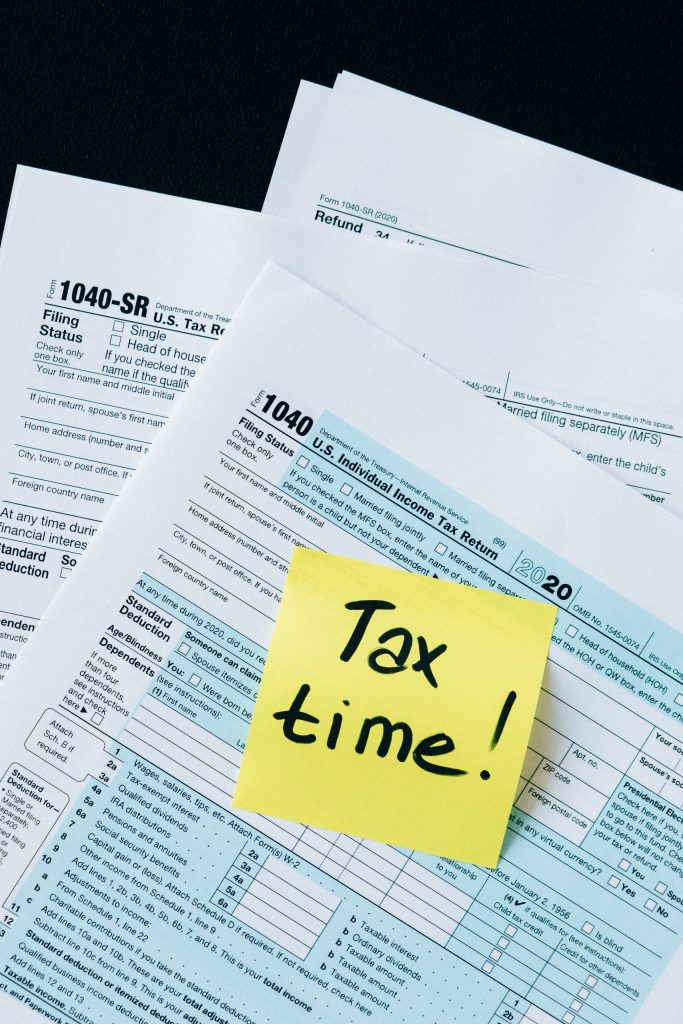When do I need to file my taxes?
Before getting started with filing taxes, you should reflect on the year and any changes. There are a few basic questions that can help you get started. Ask yourself, did you…
- Get married or divorced?
- Have a baby?
- Buy or sell a home?
- Start a 401(k) or other retirement accounts?
- Collect Social Security benefits?
- Make an early withdrawal from a retirement fund?
After determining the answers to those questions, you will need to get all the necessary documents. These may include:
- A copy of last year’s tax return
- W-2s and 1099s (and other documents showing income)
- Interest statements (mortgage, student loan)
- Records of contributions made to health savings and retirement accounts
- Any receipts or bank statements that you will use to support deductions.
If you did not receive a tax document to file, get in touch with your employer, bank, or other institution that issues your documents. If you have contacted your issuer and still fail to receive your documents by February 14th, contact the IRS.
What tax forms should I use?
It is essential to understand what different tax credits and deductions you qualify for, like earned income tax credits, education credits, and other contributions that are considered deductions. The two primary forms to use are Form 1040 and 1040-SR, which are very similar with a few differences in formatting. The 1040-SR was designed especially for senior tax filers with a different color scheme, larger font sizes, and an embedded standard deduction table.

1040 – Everyone can file this form and should be selected if the filer has:
- Income or combined income is over $50,000
- Itemized Deductions
- Self-employment income
- Income from the sale of property
1040-SR – This form is available for those who were born before January 2nd, 1956. Employment is not a requirement for this form, meaning filers can be employed, unemployed, or retired. It allows income reporting from sources parallel to seniors such as:
- Investment income
- Social Security
- Distributions from qualified retirement plans, annuities, or similar deferred-payment arrangements
If taxpayers filing a 1040-SR would like to itemize deductions, they can do so by filing a 1040-SR with a Schedule A, Itemized Deductions.
Schedule A – Used for calculating itemized deductions to reduce the amount of money owed. Some items that can be deducted on this form include:
- Part of medical and dental expenses
- Certain interest amounts paid
- Certain casualty and theft losses
Commonly overlooked tax deductions
There are many valuable tax write-offs that the average taxpayer has no idea about. Whether you’re familiar with basic tax regulations or not it’s worth reviewing possible tax deductions to see if there’s more opportunity to save yourself some money.
- State sales tax: This may be an excellent option for those who live in states that don’t impose an income tax. Those individuals will decide to deduct state and local income taxes or state and local sales taxes. The best option for most income-taxing-states is state and local income tax deduction. You can determine how much of your state and local sales taxes you can deduct by using the IRS’s calculator.
- Reinvested Dividends: This is not technically a deduction but can ultimately reduce your tax liability overall. You should include any automatic dividends from mutual funds reinvested in your costs basis because you could reduce your taxable capital gain when you sell shares.
- Out-of-pocket Charitable Contributions: You should keep track of any large and small qualified expenses. Even as little as ingredients for cookies donated to a bake sale, a few small charitable expenditures can add up over time.
- Student Loan Interest: You can take the deduction for this if you are obligated to pay it, even if you didn’t pay it yourself. Under the new guidelines, the IRS will view someone else paying for it as if you were given the money and used it to pay a student loan. To be eligible for this deduction, you must meet all of the requirements.
- Child and Dependent Care: A maximum of $6,000 that qualify can be used for the Child and Department Care Tax Credit.
- Certain Jury Duty Fees: You could claim the amount you paid as an adjustment to your income if your company paid you while you were on jury duty and you were required to turn in the pay from the court of your jury duty.
Are tips taxable?
The debate of tips being taxable or not is widespread. Yes, tips are taxable, even your cash tips, because they count as income. If you receive tips amounting to $20 or more, you should report them to your employer each month. Tips can include cash left by customers, the extra charges to customer’s debit or credit cards, tips distributed from an employer, and even the tips shared by other employees. However, the IRS classifies service charges, fees automatically added to a customer’s bill, as regular wages. You will see these additional funds on a paycheck rather than the end of a shift, so they are not considered tips. Some common service charges include:

- Gratuity automatically added for large parties
- Bottle service charges
- Delivery charges
- Room service charges
It is important to keep a good record of the tips you receive, whether in cash form or funds via debit or credit card. If you share the total amount of tips, record what you took home that day, not the overall amount before the split. If you do not have a sound tracking system, the IRS provides a Form 4070A available for use. There are some requirements the IRS asks when reporting your monthly tips, such as:
- Report monthly tips if it totals $20 or more (you can use Form 4070A for this). You will need to turn this in on the 10th of the following month of receiving those tips.
- You will not give the form to the IRS; you will give it to your employer so they can ultimately calculate how much payroll tax to withhold from your paycheck.
- Your employer can make it a requirement to report your tips more than once a month.
- Your employer can make an electronic reporting system available for use instead of the paper Form 4070.
Choosing not to report your tips could make things complicated, especially as tips on a credit or debit card leave a paper trail. Meaning, if you get audited and do not report those tips, you could be subject to penalty. Additionally, the Social Security Administration will not know the true amount of money you earned that year, which may affect the size of your benefits when you retire. If you did not keep track of your tips but would like to start, the IRS provides a Form 4137 that will help. This form will allow you to report overlooked tips and pay back your fair share when you file. However, it is critical to understand you may face a penalty of 50% of the Social Security and Medicare taxes you owe on top of those taxes. However, if you can provide a statement claiming you failed to report your tips to your employer due to
reasonable causes and not from willful neglect attached to your return, you may be able to avoid the penalty.
New things to consider when filing taxes in 2021?
This year it is important to consider some new factors involving credits to claim and what deductions to take before filing your tax return. Some of these updates include recovery rebate credit and refund interest payment.
Recovery Rebate Credit: The Coronavirus Aid, Relief, and Economic Security (CARES) Act and the COVID-related Tax Relief Act authorized the Recovery Rebate. This rebate is essentially a tax credit against your 2020 income tax and will increase your tax refund or decrease the amount you owe. If you believe you qualify, there are instructions with a worksheet on your tax form (1040 or 1040-SR) to figure the amount of any Recovery Rebate Credit you are eligible for. Individual taxpayers might be eligible to claim this rebate if all requirements were met in 2020. At least one of the following must apply to them:
- They didn’t receive an Economic Impact Payment in 2020
- They are single, and their payment was less than $1,200
- They are married, filed jointly for 2018 and 2019, and their payment was less than $2,400
- They didn’t receive $500 for each qualifying child
Refund Interest Payment: Some who received a federal tax refund in 2020 may have been paid interest. People were sent interest payments from the IRS in 2020 if they filed their 2019 federal income tax returns timely and received a refund. These interest payments are taxable and must be reported on 2020 federal income tax returns. If you received an interest payment of at least $10 last year, the IRS will send you a form, 1099-INT, Interest Income, in January 2021.
Loan at Last Can Help!
At Loan at Last, we offer installment loans with a quick application process and same day funding if approved early enough in the day. We lend to people with all types of credit backgrounds and are committed to giving our customers transparent loan terms and a payback schedule that accommodates their budget. Paying back these loans can help you build your credit if you make your payments on time. To get started, fill out our online loan application here or give our customer care team a call at (844) 676-8550 Monday-Friday 7AM-7PM CST and Saturday 8AM-4:30PM CST, or send a message to customerservice@loanatlast.com.



